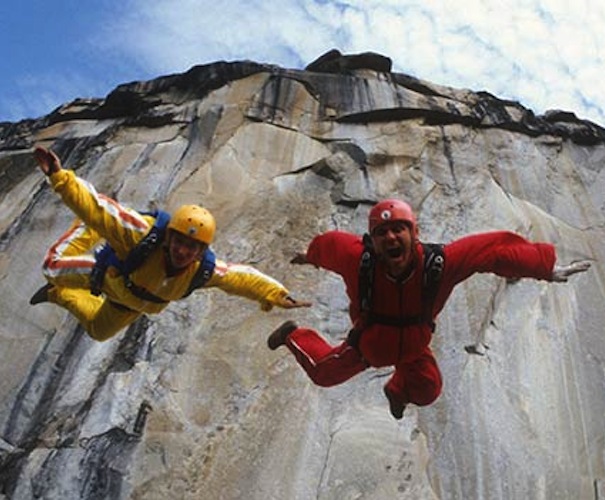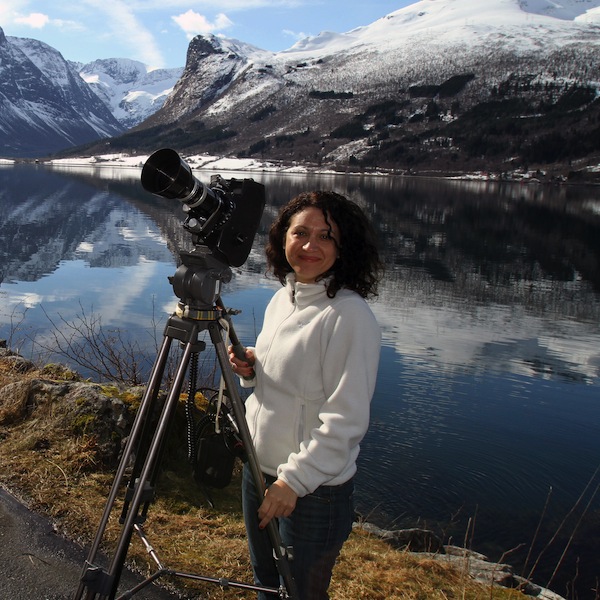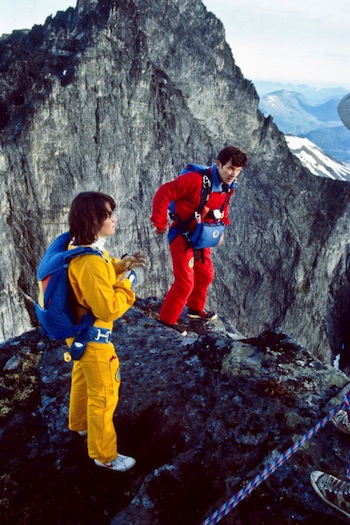Film Interview: No Jumping to Conclusions in ‘Sunshine Superman” — Talking to Director Marah Strauch
Marah Strauch’s documentary tries to fathom Carl Boenish’s motive for taking his last leap, and in doing so captures some the terror and ecstasy that can tempt one to such acts.

A scene from “Sunshine Superman.” Courtesy of Magnolia Pictures.
By Peter Keough
Had Alfonso Cuarón not already taken the name for his Oscar-winning 2013 film, Marah Strauch’s documentary about extreme sportsman Carl Boenish would have been called Gravity. Instead she settled on Sunshine Superman, which is currently screening at Cambridge’s Kendall Square Cinema. Too bad, because her film rivals Cuaron’s in its spectacular imagery, and does so without resorting to special effects. Plus her subject has more in common with a force of nature than with Donovan’s ’60s psychedelic light ditty.
Child-like, charismatic, and quasi-mystical in his need to jump off towering objects, Boenish — along with his devoted, level-headed, but no less driven wife Jean and some other daredevils — decided to elevate this obsession from a kind of Merry Pranksterism to an organized movement. Thus was founded BASE jumping (the acronym stands for the four launching points: Base, Antenna, Span and Earth) in 1981.
It has since spread across the world, and occasionally appears in headlines when a practitioner meets a tragic end, as was the case when famed climber Dean Potter and Graham Hunt made a fatal leap in Yosemite National Park on May 16. The total number of such fatalities can be found on the BASE jumping website BLiNC.
Boenish himself made one jump too many, killed when he took on Norway’s formidable Troll Wall on July 7, 1984, a day after he had broken the record for highest jump on a TV special hosted by David Frost. Strauch’s film tries to fathom Boenish’s motive for taking that last leap, and in doing so captures some the terror and ecstasy that can tempt one to such acts. In addition to her own vertiginous footage, Strauch integrates many thrilling sequences from the 16 mm films that Boenish made of his jumps, many from helmet-mounted cameras.
Strauch was in Boston in April when her film played at the Independent Film Festival of Boston and talked about the terrifying ecstasy that could drive one to such acts of daring, the danger of hubris, learning lock-picking at Werner Herzog’s Rogue Film School, and more mundane topics such as how to convince financial backers that a woman can direct her own film.
Arts Fuse: I suppose you’ve gotten this question before: Have you BASE jumped?
Marah Strauch: Yes. Most people ask me if I have. I have not. They ask at every Q & A. Every single time. Which is interesting because if you think of other documentary topics like, let’s say I made a film about heroin addiction. Nobody would ask me if I had ever done that. But there’s something about BASE jumping that people wonder if I’d done it. Not that I’m opposed to it. I don’t think I’d be very good at it. You’re supposed to have a certain amount of eye hand coordination. Which I kind of lack.
AF: How did you happen upon the subject?
Strauch: My uncle was a BASE jumper and had done it for years. I found a little bit of footage of it that WAS left behind after he died — in a car accident. My dad had it and I had just graduated from RISD and I was kind of looking at this footage and I was thinking, what could I do with it? I wasn’t even a filmmaker at the time. So I just followed the names on the labels. I thought I was shooting a film about my uncle and then I found Carl’s footage and I decided the film really needed to be about Carl and Jean. There was a lot of footage that Jean had that I worked with. For whatever reason, I think I was just the right person to make this film. If there is that kind of thing, I think it was meant to be.
AF: That’s the kind of thing Carl says often in the movie – that everything happens for a reason. Do you believe that too?
Strauch: I don’t know. I think that’s one of the topics in my film. I don’t know if everything happens for a reason. If you look at physics everything happens for a reason. But I don’t know if I believe in that in the spiritual sense. I believe in it in an everyday empirical sense.
AF: You said you weren’t a filmmaker before you took on this project. What did you study at RISD?
Strauch: I was a glass sculptor but I spent a lot of time in the film department. I loved film. I was always interested in a lot of different arts. I watched movies when I was blowing glass. So I was lucky to end up at RISD, It has a great glass department and a great film department, so supercool.

Marah Strauch, director of “Sunshine Superman.” Photo courtesy of Magnolia Pictures.
AF: Have you seen Werner Herzog’s Heart of Glass (1976)?
Strauch: I love that movie.
AF: Your film also brings to mind Herzog’s The Great Ecstasy of the Woodcarver Steiner (1974).
Strauch: I love that too. I’m a huge Herzog fan, since high school, which is pretty weird.
AF: I hear you attended his Rogue Film School.
Strauch: Yes — in 2010. The very first one. You have to put a little application together and I got to be in his class which was like the most fantastic thing. I loved it. He teaches lock-picking, how to forge documents. Things that are actually helpful. How to solve problems in a creative way rather than the typical way. It’s more useful than what you’d learn in film school, probably.
I was in the middle of making Sunshine Superman. He saw a clip and we talked about it a little bit. At the time I had only a little bit [of Boenish’s 16 mm film stock] transferred. He really liked the character and I think it was a film that spoke to him. That physical kind of filmmaking.
AF: He also made a movie about a risk taker who filmed himself and ended up dying – Grizzly Man (2005).
Strauch: It’s a really different film but there is that sense of being obsessed and doing this physical thing you wouldn’t normally want to do. I think I would prefer to BASE jump rather than live amongst grizzly bears.
AF: You have some understated re-enactments of events in the film. What was your reason for that?
Strauch: I realized halfway through the process that were a lot of stories I wanted to tell that I had no visual material for. Carl was great at shooting BASE jumping. But he didn’t shoot any personal footage. So there was the difficulty of 16mm footage with no sound and trying to figure out how to show these personal moments. I wanted to have something because I didn’t want to just have talking heads in what should be a cinematic experience. So I had subtle reenactments. I’m not a huge fan of reenactments. But there was no way to avoid them in this film other than having just a history of BASE jumping or a series of talking heads.
AF: They are similar to Errol Morris’s The Thin Blue Line (1988) http://www.imdb.com/title/tt0096257/?ref_=nv_sr_1 in that some hover around the same ambiguous events as if trying to figure out a mystery.

Jean and Carl Boenish standing on a ledge preparing to jump, in a scene from “Sunshine Superman.” Photo courtesy of Magnolia Pictures.
Strauch: I love The Thin Blue Line. It’s a great movie. There has been a lot of backlash towards reenactments lately. I read an article that said that The Thin Blue Line was to blame for reenactments. I think that’s so limited. Documentaries are a cinematic medium and to limit yourself to how you can tell stories is a shame.
Herzog said that you don’t want to be a fly on the wall; you want to be a hornet that stings. But you’re always projecting onto film your own point of view. Even people who say they are strict documentarians – they are always projecting their point of view in the edit. The argument that you tell more of the truth if you’re using reenactments, I totally don’t agree with that. I love cinema vérité filmmaking if it’s being directed directing. That’s another thing Herzog said. Just because you’re making a documentary doesn’t mean you don’t have to be a director.
AF: Do you have to be a man to be a director? You pitched the idea to investors who wanted to do it, but only someone else directed.
Strauch: I can’t answer that. I was also a first time filmmaker, so that’s fair enough as a reservation. I wanted to make a fairly high budget documentary and I had a really clear image of what I wanted to do. I didn’t have a lot in my background to prove that I could make a film. So it kind of makes sense that at some point they might not have wanted me to direct it. Of course, I got no American backing for my film at all. I think that says something, but I don’t know what. But I had no problem in Europe getting financing.
AF: How about PBS or other media?
Strauch: I never would have gotten PBS. We had certain TV partners who were interested if I didn’t direct. It’s been a super challenge. Even now for my second project; it’s not easy-peasy. But what I did was I said I don’t care I’m going to do this until it works. I’m not going to let go of it. I think a lot of other people might have because they said we’ll give you this amount of money if you just back out. And I said, eh, I’m going to hold onto it. And that’s what I did.
The Norwegian government supported the project. A lot of that helicopter stuff and other stuff we did in Norway was very much supported by the Norwegian film institute. I don’t know where I’d be without Norway. We raised money on Kickstarter, we had BASE jumpers who were investors in the film. Technicolor gave us a lot of inexpensive transfers. We had a lot of helpful people along the way. We didn’t have any grants, though. As a documentarian I’ve been very frustrated because there’re a lot of grants if you want to make social issue documentaries. But not if you’re making pop culture docs.
AF: Too frivolous?
Strauch: Oh yes. I think that’s a common opinion about this film, but I would argue that experiencing one’s joy in life is not frivolous. These people invented something. That’s not frivolous. Jean was an early female athlete. There’s more and more women involved in the sport and they’re really good at it. Jean was amazing at it. Athletically I’d say she was better than Carl. There are a lot of amazing things these people did.
AF: It is also a film about life and death and the power of the will. It is almost religious. I was surprised when you let slip inadvertently late in the film that Carl was a Christian Scientist. Why was that?
Strauch: There were some edits where I put it earlier in the film. It made me uncomfortable. I thought it might flavor things too soon and people might tune out because here is such a stigma to Christian Science that turns some people off. I could also have left it out. There were decisions about how much to keep in. He quoted Mary Baker Eddy in many of the things he said.
Peter Keough, currently a contributor to The Boston Globe, had been the film editor of The Boston Phoenix from 1989 until its demise in March. He edited Kathryn Bigelow Interviews (University Press of Mississippi, 2013) and is now editing a book on children and movies for Candlewick Press.
Tagged: BASE jumping, Carl Boenish, documentary, extreme sports, Marah Strauch, Peter Keough, RISD
